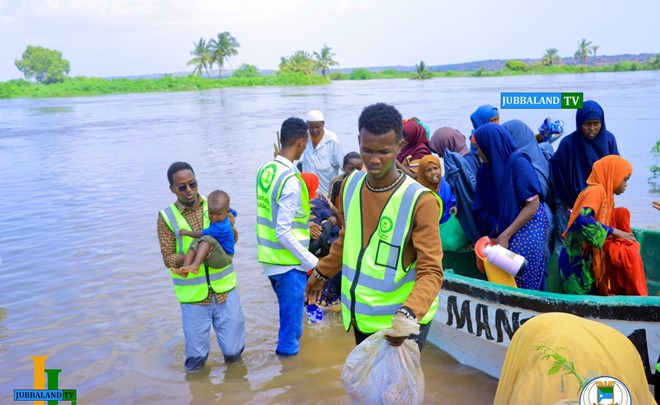
Hassan Istiila
Monday December 4, 2023

Mogadishu (HOL) - In the flood-ravaged regions of Somalia, where the death toll has tragically reached 120, stories of silent suffering are emerging. Children succumbing to hunger and others resorting to consuming grass as a last resort speak volumes about the dire conditions faced by communities on the brink.
Six months after Somalia emerged from a historic drought that brought the country to the brink of widespread famine, another climate shock struck. Heavy rains and floods have inundated south-central Somalia since October, affecting over 2.4 million people. Flash and riverine floods have displaced approximately one million people in South-West, Galmudug, Puntland, Hirshabelle, Jubaland states, and the Banadir region.
Fleeing their homes due to depleted food and water supplies, some flood-affected facilities in Hiiraan and Gedo regions have resorted to placing beds in floodwaters. Markets are closed, telephones are switched off, and there is now a fear of crocodiles and mosquitoes.
Last week, in Bundaweyn village in Beledweyne town, three children died from hunger while stranded in floodwaters. Beledweyne's Mayor, Nadar Tabah Maalin, reported that several other children remain stranded, with additional cases of malnutrition. Abdifatah Hussein Ali, a father who recently arrived at the Rage Edle IDP camp after fleeing floods, shared the heartbreaking loss of his two-month-old child due to malnutrition.
"My family has faced a difficult situation since we fled from the floods in Beledweyne. First of all, we lacked food. At night, my baby was crying for milk since their mother's breast did not produce milk. I was a fisherman, but now I'm afraid to go into the water."
Mohamed Abdi, a father of five in Beledweyne, emphasized the unprecedented nature of the floods, describing how his family now lives on floodwater in the town center. "The heavy rain starts after sunset and continues until morning. You don't know where to go. The whole neighbourhood is flooded. There is no more fear than that."
Displaced people from the recent flooding along the Shabelle River in Jalalaqsi district, Hiiraan region, face dire living conditions. District Commissioner Nur Mohamed Absuge Nur Dheere confirmed that hundreds of families grappling with severe food shortages have resorted to eating grass out of necessity.
"I have witnessed people experiencing hunger, but I have never seen a desperation that drives someone to consume grass. This is unprecedented for me. I used to hear about migrants resorting to drinking their own urine. Migration is often a quest for a better life and dignity, driven by the hope of finding clean water in their home country. It's a choice they make. However, witnessing someone in their homeland, with no food to eat and consuming grass for survival, is a stark reality," remarked the commissioner.
While humanitarian efforts have reached approximately 820,000 affected people, the need for life-saving assistance rapidly rises as flooding expands across the country. Thousands are cut off from markets and supplies, roads, bridges, and airstrips have been extensively damaged, and vital facilities like hospitals and schools have been closed in some areas. The risk of cholera has spiked.
Ms. Nimo Hassan, Director of the Somali NGO Consortium, stressed the urgent need for sustainable solutions and disaster preparedness. "Investing in flood-resistant durable solutions and early warning systems can save lives in Somalia," she added.
Climate change is undeniably a harsh reality in Somalia. Over the past five seasons, the country has experienced consecutive failed rains, exacerbating the situation. The recent arrival of El Nino has further compounded the crisis, leading to the flooding of one-third of Somalia's landscape.
The country is highly vulnerable to climatic shocks. Yet, it receives only about $300 million a year for climate change programs, mostly responsive rather than preventive, out of the required $16 billion before 2030, according to Somalia's National Determined Contribution (NDC).
At COP28 in Dubai, Deputy Prime Minister Salah Ahmed Jama emphasized the inadequacy of current climate finance projects in Somalia, urging multilateral development banks to focus on meaningful ways to avert climate impact.
"A concerning trend marks the implementation of climate finance projects in Somalia – very few of these initiatives surpass the $500,000 mark. It's important to recognize that $500,000 falls short of triggering the transformative change needed. They may save a life for today."
"After 30 years, we are here as part of the developing countries to be part of the solution. It would be a dire situation after 30 years if we are still discussing the capacity of African States," he warned.